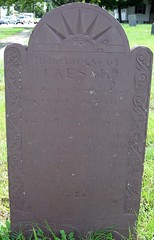Cemetery work can sometimes be thought provoking. Today, this gravestone epitaph is politically incorrect but in the time of 1780; it must have been meant as a compliment.
"Some curious inscriptions were placed upon the stones here. The most famous one is doubtless that over Caesar the slave.
He was given by his mother while he was an infant to Lieutenant Josiah Maxcy When the latter died Caesar came into the hands of Lev Maxcy.
Being a waiter in the public house so long kept on the site of the Old Garrison and which in those days was the resort of many travelers on that route he was known to all the region round and after his death many of these travelers used to stop over to visit the ground and read the strange inscription over his grave.
He was a member of the Baptist church at North Attleborough. Tradition has preserved numerous anecdotes of him He was simple hearted but proved through a long life a remarkably honest and faithful servant in the family where he lived. He survived his first master and after his own death January 15 1780 was buried in the same yard.
A decent stone was raised over his grave by his younger master Levi Maxcy in whose care he was left as has been said with the following inscription which in its graphic lines will long preserve the memory of Caesar the faithful Ethiopian."
"In memory of Caesar
Here lies the best of slaves
Now turning into Dust;
Caesar the Ethiopian craves,
A place among the just.
His faithful soul has fled
To realms of heavenly light,
And by the blood that Jesus shed
Is changed from Black to White.
January 15 he quitted the stage
In the 77th year of his age
1780 "
Here lies the best of slaves
Now turning into Dust;
Caesar the Ethiopian craves,
A place among the just.
His faithful soul has fled
To realms of heavenly light,
And by the blood that Jesus shed
Is changed from Black to White.
January 15 he quitted the stage
In the 77th year of his age
1780 "
"Caesar's stone has been broken in pieces and taken away The stones in yard were dark of what we call black slate The only white one there was to the memory of the wife of Caesar's owner."
From:
A Sketch of the History of Attleborough From Its Settlement to the Division By John Daggett, 1805-1885, John Daggett, Amelia Daggett Sheffield; published 1894. Chapter XXI p. 727-728 [Google Books]
Taken in North Attleboro, MA in the Old North Cemetery (1676), GR11, as a present for me by my friend, Linda Binns.


No comments:
Post a Comment